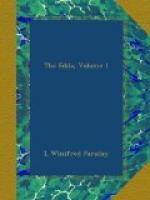(4) Borrowed: Bugge, Studien ueber die Entstchung der nordischen Goetter- und Heldensagen (transl. Brenner, Muenchen, 1889).
Vegtamskvida. (Page 17.)
The word hrodhrbadhm (which I have given as “branch of fame”) would perhaps be more accurately translated “tree of fame,” which Gering explains as a kenning for Baldr. But there are no kennings of the same sort in the poem, and the line would have no meaning. If it refers to the mistletoe, as most commentators agree, it merely shows that the poet was ignorant of the nature of the plant, which would be in favour of its antiquity, rather than the reverse.
Saxo Grammaticus. (Page 18.)
English translation by Professor Elton (London, D. Nutt, 1894). As Saxo’s references to the old Gods are made in much the same sympathetic tone as that adopted by Old Testament writers towards heathen deities, his testimony on mythological questions is of the less value.
The Mistletoe. (Page 20.)
It seems incredible that any writers should turn to the travesty of the Baldr story given in the almost worthless saga of Hromund Gripsson in support of a theory. In it “Bildr” is killed by Hromund, who has the sword Mistilteinn. It must be patent to any one that this is a perverted version of a story which the narrator no longer understood.
Loki. (Page 26.)
It is hardly necessary to point out the parallel between Loki and Prometheus, also both helper and enemy of the Gods, and agent in their threatened fall, though in the meantime a prisoner. In character Loki has more in common with the mischievous spirit described by Hesiod, than with the heroic figure of Aeschylus. The struggles of Loki (p. 28) find a parallel in those of the fire-serpent Typhon, to which the Greeks attributed earthquakes.
Eclipse Ritual. (Page 35.)
Mr. Lang, in Myth, Ritual, and Religion, (London, 1887) gives examples of eclipse ritual. Grimm, in the Teutonic Mythology, vol. 2, quotes Finnish and Lithuanian myths about sun-devouring beasts, very similar to the Fenri myth.
The Skalds. (Page 35.)
All the Skaldic verses will be found, with translations, in the Corpus Poeticum.



